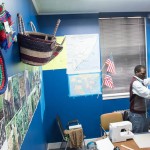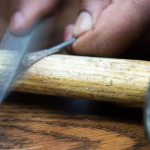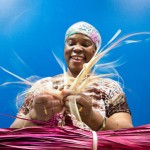Every culture has its artists and artistry. Thanks to the Maine Arts Commission, three Somali Bantu artists in Lewiston recently received grants to mentor others in their art and thereby pass along the tradition to future generations.
Each of the three artists is unique, with a different set of skills and perspective to offer their apprentices: One is a metal worker and needle maker, another is a basket maker and weaver, and the third sews garments and embroiders.
The grants were awarded to help cover each master artist’s teaching fees and other costs. Preference was given to apprentices who were members of the same ethnic, religious, occupational, tribal or familial group as the master artist.
The artists often work at the office of the Somali Bantu Community Mutual Assistance Association of Lewiston/Auburn at 145 Lisbon St. Informal lessons can be arranged on an individual basis through the association, and products made by the artists can be purchased through the association.
The association’s website at www.sbcmala.org has information on traditional arts, classes and demonstrations, and also has an online catalog of products. Or contact the office by calling 784-5556.
Muhidin Libah: metal worker
For Muhidin Libah, using simple tools to make small items from scrap metal has always been more about survival than art. “For most of us, these crafts have been a way to put food on the table,” he said.
Libah, who is executive director of the Somali Bantu Community Mutual Assistance Association of Lewiston/Auburn, is also a tumaal, a metal worker, who learned at an early age how to fix watches and make serviceable items like tin cups and funnels from sheets of aluminum.
Although he didn’t have his own pair of shoes until he was 18 years old, Libah also became skilled at making needles that he and his father used for making shoes they could sell. Now he makes hundreds of them for Somali Bantu basket weavers to use for their craft.
To repurpose the pieces of cast-out metal — such as the ribs of a broken umbrella — Libah, along with his apprentice Abdulahi Muse, use files, pliers, a hammer, a chisel and screwdrivers to produce the handmade needles. He finishes them with handles made from old pens, corks or bits of scrap wood.
Libah, who has been in the United States since the age of 13, uses his joyful optimism to also encourage other artists who work at the Somali Bantu Community Association in Lewiston.
Atiya Haji: Basket maker
Atiya Haji is a master Somali Bantu basket maker who makes dambiilo (market baskets); masafs (flat baskets with handles that can be rolled around an item to be carried); and sali (sisal mats for sitting or kneeling on).
She is working with her apprentice, Malyun Negye, as well as teaching others the art through the Somali Bantu organization’s basket weaving program.
Basket making is one of the oldest traditional arts and a significant aspect of the Somali Bantu culture. Not just containers, baskets are an art form that represents the dignity of the bearer. In Somalia, a carrier’s social status is determined by the type of basket they have and also identify you by your region.
Industrious to a fault, Haji works tirelessly. Her strong, capable hands are sometimes a blur as she effortlessly splits the colorful ashindi palm leaves into long strands with her fingers and then weaves them into a unique basket.
Hassan Barjin: Garment maker
Hassan Barjin, an accomplished tailor for many years at the Dedaab refugee camp in Kenya, creates embroidered garments for the women in the Somali Bantu community of Lewiston.
With the fierce dignity of a captain piloting his ship, Barjin sits at the basic Singer sewing machine with a tape measure draped around his neck. Surrounded by waves of silky African cloth of every hue, he bends to the task of creating traditional dresses and under-skirts that will be sold within the community.
It’s startling to see how quickly he can sew together a garment, calmly tossing it aside, reaching for another bolt of fabric, and continuing on. He is sharing his tailoring and embroidery skills with apprentice Halima Mohamed.





